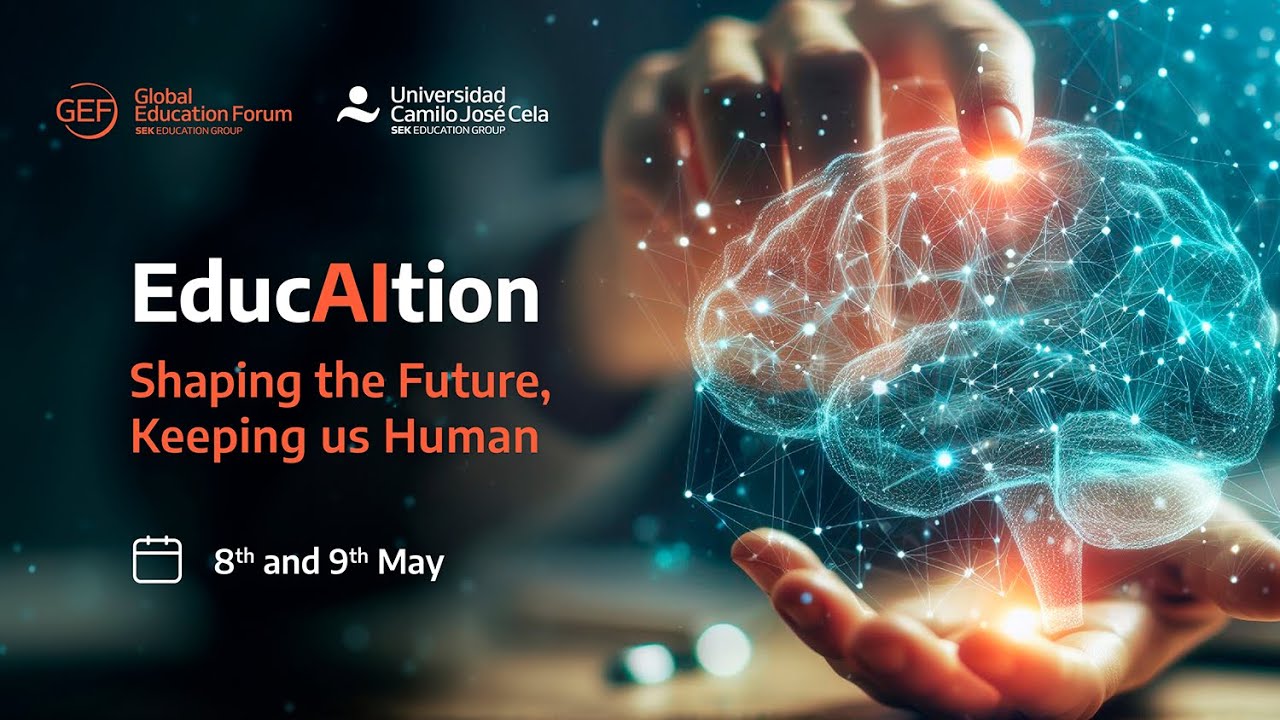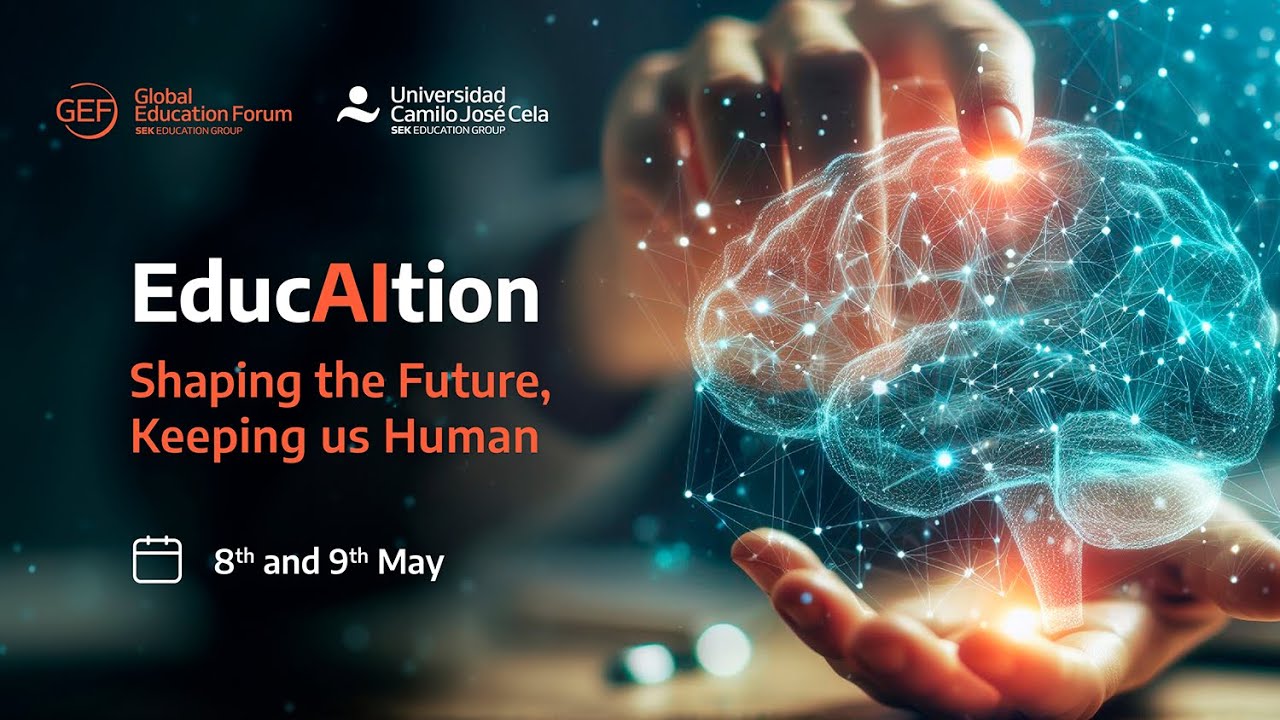GEF Madrid 2024: AI and Personalised Learning
Summary
TLDRIn this AI and personalized learning session, a panel of experts discusses the potential and challenges of tailoring education to individual needs. They explore the role of generative AI in creating adaptive learning experiences, the importance of understanding learners' profiles, and the balance between technology and human interaction in education. The discussion highlights the possibility of AI-driven feedback mechanisms, the need for a holistic understanding of learners, and the importance of human elements in teaching that AI cannot replace.
Takeaways
- 🧠 Personalized learning through technology aims to provide each learner with a tailored experience that considers their needs, pace, and learning style.
- ⏱ The moderator emphasizes the time constraint, highlighting that AI, despite its capabilities, must adhere to the laws of mathematics and time management during the panel discussion.
- 📚 George discusses the historical aspect of personalized learning and how generative AI presents a new approach to achieving the 'Holy Grail' of education, which is personalized learning at scale.
- 🕵️♂️ Alvin envisions a future where AI and wearable devices offer personalized learning experiences, potentially creating an 'apprenticeship' model that adapts to the individual learner in real-time.
- 🛠 Rafael suggests that AI can serve as the 'perfect 50% teacher', providing knowledge and answering questions but acknowledging that human teachers still play an irreplaceable role, especially in emotional and social aspects of learning.
- 🤖 Maria Isabel expresses both excitement and concern about AI's role in education, emphasizing the importance of maintaining human connection and the holistic development of students.
- 🔧 John describes a practical application of AI in providing feedback for hard-to-evaluate skills, suggesting that AI can offload cognitive load from teachers, allowing them to focus more on individual student needs.
- 🛡 Unice discusses the development of tools that work in conjunction with AI to enhance personalized learning, such as visual aids and multiple-choice question generation, catering to different learning styles.
- 🔄 George mentions the importance of student profile data in personalizing the learning experience, suggesting that integrating this data with AI can help in creating a more nuanced and effective learning environment.
- 🤝 The panelists agree that while AI has the potential to revolutionize personalized learning, it's crucial to balance technological advancements with a deep understanding of human needs and educational goals.
- 🚫 The discussion concludes with a reminder of the limitations of AI, particularly the importance of not losing sight of the human element in learning and the need for further exploration and professional development in AI for educators.
Q & A
What is the main topic of the session described in the transcript?
-The main topic of the session is AI and personalized learning, discussing its current state, future potential, and the role of generative AI in education.
What is personalized learning as defined by George in the transcript?
-Personalized learning, as defined by George, is the intention of providing each learner with a learning experience that reflects their needs, learning pace, and best approaches to be an effective learner, often through technology.
What is the 'Bloom's 2 Sigma difference' mentioned by George, and why is it significant in education?
-Bloom's 2 Sigma difference refers to the significant educational benefit achieved through one-on-one tutoring. It signifies the goal in education to replicate the personalized attention and effectiveness of a tutor in a scalable way using technology.
How does Alvin envision the future of personalized learning with AI and wearable devices?
-Alvin envisions a future where AI and wearable devices provide personalized learning experiences tailored to each individual's needs, potentially including multi-dimensional, multimodal presentations of information and real-time feedback based on the learner's responses and understanding.
What is the role of a teacher according to Maria Isabel, and how does AI impact this role?
-Maria Isabel believes the role of a teacher is to build connections with students, develop curiosity, agency, and a sense of belonging. AI impacts this role by potentially taking over some aspects of personalized learning and feedback, prompting reflection on what makes a good teacher and the human element in education.
What is the potential issue with students relying on AI for learning, as highlighted by Rafael?
-Rafael highlights the potential issue of conflict between what an AI tutor says and what a human professor teaches. It raises concerns about the credibility and consistency of information and the challenges of managing such conflicts in educational settings.
What is the current limitation of AI in providing personalized learning, as discussed by John?
-John points out that while AI can provide initial feedback and offload cognitive load from teachers, it currently lacks the ability to nurture creativity and respond to the individual student's needs beyond knowledge dissemination.
What is the importance of understanding the human element in AI and personalized learning, as emphasized by Rafael?
-Rafael emphasizes the importance of understanding what makes us human to ensure that AI does not get out of control and to identify the real benefits and problems. He suggests that we need to study humans holistically to better integrate AI into learning.
How does the panel view the potential of AI to scale personalized learning, as discussed by Unice?
-Unice discusses the potential of AI to scale personalized learning by creating tools that can cater to a large number of learners, providing immediate feedback, and using visual aids to cater to different learning styles, thus overcoming the limitations of traditional classroom settings.
What is the significance of student profile data in personalized learning, and how can it be integrated with AI, as mentioned by George?
-Student profile data is significant in personalized learning as it allows the system to understand the learner's needs, strengths, and weaknesses. George mentions that integrating this data with AI can help tailor responses and interventions to better suit the individual learner, enhancing the effectiveness of personalized learning.
What is the challenge of implementing AI in education, and how can it be addressed, as suggested by the panel?
-The panel suggests that challenges include technical limitations, resistance to change, and the need for professional development. Addressing these challenges involves continuous exploration and adaptation, fostering a mindset open to change, and providing educators with the necessary training to effectively use AI tools.
Outlines

このセクションは有料ユーザー限定です。 アクセスするには、アップグレードをお願いします。
今すぐアップグレードMindmap

このセクションは有料ユーザー限定です。 アクセスするには、アップグレードをお願いします。
今すぐアップグレードKeywords

このセクションは有料ユーザー限定です。 アクセスするには、アップグレードをお願いします。
今すぐアップグレードHighlights

このセクションは有料ユーザー限定です。 アクセスするには、アップグレードをお願いします。
今すぐアップグレードTranscripts

このセクションは有料ユーザー限定です。 アクセスするには、アップグレードをお願いします。
今すぐアップグレード5.0 / 5 (0 votes)






